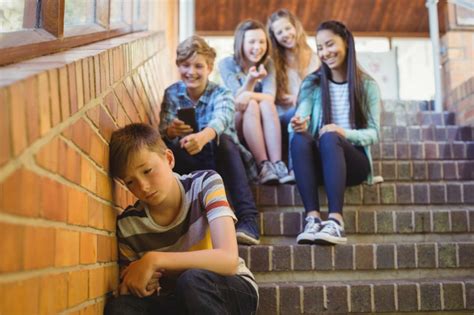Imagine being back in grade school, navigating the complex social dynamics of fitting in and finding your place among peers. It’s a time fraught with uncertainties, insecurities, and the ever-present fear of rejection. This fear can influence how children behave within their social circles, shaping their decisions to conform or resist group norms.
A recent study conducted at the University of Georgia delved into how this fear of rejection impacts children’s behaviors within peer groups. The research highlighted that children who experience anxiety about being rejected are more likely to conform to academic expectations such as studying diligently and adhering to classroom rules. They tend to steer clear of troublemaking activities, opting for a more rule-abiding approach.
On the flip side, kids who anticipate rejection actively demonstrate resistance towards conforming not only academically but also socially by rejecting popular trends. This concept of “rejection sensitivity” encompasses two main components: rejection expectancy, which involves anticipating rejection cognitively, and anxious or angry anticipation, which reflects the emotional response when facing potential rejection.
“Rejection sensitivity is a really concerning characteristic in children,”
emphasized Michele Lease, a professor at the Mary Frances Early College of Education. She further elaborated on how this sensitivity could manifest in various ways – from withdrawal and anger to efforts to fit in by conforming or ingratiating themselves while suppressing assertiveness. Additionally, Lease pointed out that rejection sensitivity could even serve as an early indicator for depression before any visible symptoms emerge.
The study led by Cayenne Predix involved over 350 fourth and fifth graders who responded to questionnaires featuring scenarios designed to gauge their likelihood of emulating their peers’ behaviors across academics, trend-following, and mischievous actions. Lease underscored the significance of this developmental phase where children strive to navigate their peer networks and establish their position within friend groups.
“It’s crucial to understand that at this age, one of their primary tasks is learning how to fit in,” Lease noted. While friendships are an integral part of childhood interactions involving play and shared activities; figuring out where they belong within these intricate social structures remains a significant challenge for youngsters during these formative years.
Interestingly, witnessing relational victimization like gossip or bullying did not consistently sway children’s conformity levels across different behaviors as much as their emotional responses did. Anxious kids tended to avoid disruptive actions while aligning with positive academic behaviors exhibited by peers such as increased studying or active class participation. Conversely, those harboring expectations of rejection showed reluctance towards both academic and social conformity.
The findings shed light on the pivotal role that emotional and cognitive reactions play in influencing children’s tendencies towards conformity within friendship circles amidst instances of relational aggression like gossip or bullying.
Moving forward from this research endeavor; Lease along with her team comprising Mihyun Kim, a doctoral candidate at UGA, and Kyongboon Kwon from the University of Wisconsin-Milwaukee aim to delve deeper into understanding how norms set by friendship groups impact sensitivity towards rejection and subsequent behavioral conformity patterns.









Leave feedback about this